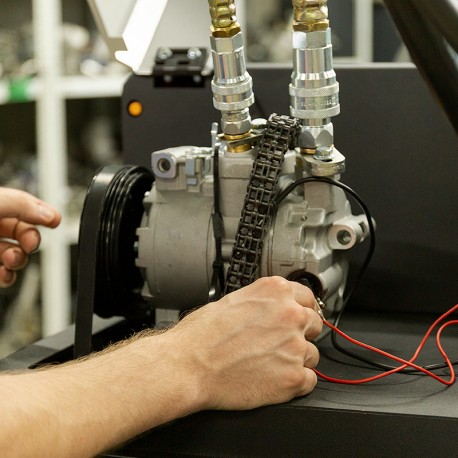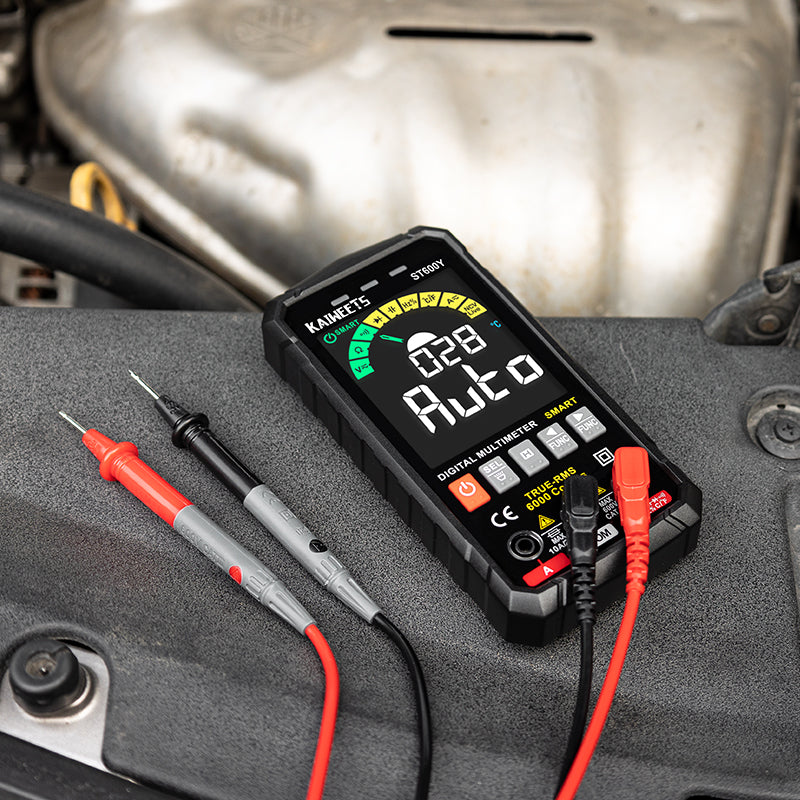How to Test a Car Ac Compressor
To test a car AC compressor, use a multimeter to check for electrical continuity and an AC gauge to measure pressure. Proper testing ensures optimal performance and longevity of your vehicle’s air conditioning system.
A well-maintained AC compressor is essential for efficient cooling and overall vehicle comfort. Regular testing and maintenance can help prevent costly repairs and ensure your car’s AC works effectively when you need it most. By following these simple steps and taking proactive measures, you can ensure your compressor is in good working condition and enjoy cool, refreshing air during your drives.
Remember, a well-tested AC compressor is key to a comfortable and enjoyable driving experience.

Credit: servicems.eu
Signs Of A Faulty Ac Compressor
If you suspect that your car’s AC compressor is malfunctioning, it’s essential to know the signs of a faulty AC compressor. Identifying these signs early can save you from a sweltering drive during the hot months.
Strange Noises
A noisy AC compressor can be an indication of trouble. If you hear grinding, squealing, or metallic screeching sounds coming from your car’s AC, it may signal a faulty AC compressor. In such cases, it’s crucial to have your AC system inspected by a professional mechanic.
Warm Air
If your car’s AC is blowing warm air, it could be a sign that the compressor is failing. This symptom may also be accompanied by inconsistent cooling and poor airflow. Addressing this issue promptly can prevent further damage to the AC system and ensure comfortable driving conditions.
Leaking Fluid
Leaking fluid around the AC compressor is a red flag that should not be ignored. Refrigerant or oil leaks can occur due to a faulty seal or worn out compressor. If you notice puddles of fluid under your car or around the AC compressor, it’s imperative to have this issue addressed promptly to prevent further damage.

Credit: kaiweets.com
Preparing To Test The Ac Compressor
When preparing to test the car AC compressor, it’s crucial to follow the correct steps to ensure accurate results.
Safety Precautions
- Wear protective gear such as gloves and safety glasses.
- Make sure the car engine is turned off before starting any work.
- Avoid direct contact with any moving parts of the AC system.
Gathering Necessary Tools
Before testing the AC compressor, gather the following tools:
- Multimeter to measure electrical continuity.
- Pressure gauge to check refrigerant levels.
- AC manifold gauge set for accurate pressure readings.
Having the right tools will help you diagnose any issues with the AC compressor effectively.
Testing The Ac Compressor
To test a car AC compressor, start by checking the system’s electrical connections and fuses to ensure they are functioning properly. Then, use a multimeter to measure the compressor’s resistance and verify if it falls within the manufacturer’s specified range.
Additionally, inspect the compressor’s clutch for proper engagement when the AC is activated.
Inspecting The Drive Belt
Examining Electrical Connections
Checking Refrigerant Levels
“` When examining the AC compressor, start by checking the drive belt. Ensure it’s not cracked or worn. Next, move on to examining electrical connections. Look for any signs of corrosion or loose wires. Last but not least, check the refrigerant levels, ensuring they are sufficient for the compressor to function optimally. By following these steps, you can efficiently test the AC compressor of your car.Using An Ac Compressor Tester
Using an AC compressor tester is a crucial step in diagnosing the functionality of your car’s AC system. It allows you to test the compressor under operating conditions, providing valuable insights into its performance. This guide will walk you through the process of using an AC compressor tester, covering how to connect the tester and interpret the test results.
Connecting The Tester
Before connecting the AC compressor tester, ensure the car engine is off and the vehicle is parked in a safe and well-ventilated area. Open the car hood and locate the AC compressor, typically situated near the engine. Follow these steps to connect the tester:
- Identify the positive and negative terminals on the compressor.
- Attach the positive (red) lead of the tester to the positive terminal and the negative (black) lead to the negative terminal.
- Securely fasten the leads to prevent any accidental disconnection during testing.
- Double-check the connections to ensure they are properly secured before proceeding to the next step.
Interpreting The Test Results
Once the tester is connected, start the car engine and turn on the AC system. Allow the compressor to run for a few minutes while observing the tester readings. The following key indicators will help you interpret the test results:
- Voltage Reading: Monitor the voltage reading on the tester display. A consistent and steady voltage output indicates a well-functioning compressor.
- Amperage Reading: Keep an eye on the amperage reading, which should remain within the manufacturer’s specified range. Fluctuating or excessively high amperage may signal compressor issues.
- Noise and Vibration: Pay attention to any unusual noises or vibrations originating from the compressor, as they can indicate potential mechanical problems.
Next Steps If Ac Compressor Fails
If your car’s AC compressor fails, the next steps involve checking the electrical connections and testing for refrigerant leaks. To determine if the compressor is faulty, conduct a visual inspection and use a multimeter to test its functionality. Additionally, ensure the system has sufficient refrigerant levels for optimal performance.
Diagnosing The Issue
If your car’s AC compressor fails, it’s important to diagnose the issue correctly before taking any further steps. This will help you determine the right course of action and avoid unnecessary expenses. To diagnose the problem, follow these simple steps:
- Check for unusual noises: Start by turning on your car’s AC system and listen for any strange noises coming from the compressor. Unusual sounds like grinding, clicking, or squealing could indicate a problem.
- Observe the cooling performance: Pay attention to the performance of your car’s AC system. If it takes longer than usual for the air to cool down or if it fails to blow cold air altogether, the compressor may be at fault.
- Inspect the compressor clutch: The compressor clutch is responsible for engaging and disengaging the AC compressor. Make sure the clutch is engaging properly when the AC system is turned on. If it doesn’t engage, there may be an issue with the compressor.
- Check for leaks: Refrigerant leaks can cause the AC compressor to fail. Inspect the AC system for any signs of leakage, such as oil stains or a noticeable decrease in refrigerant levels.
By going through these steps, you can better understand the problem with your car’s AC compressor and determine the best course of action to fix it.
Repair Or Replacement Options
Once you have identified that your car’s AC compressor is the cause of the issue, you need to decide whether to repair or replace it. Consider the following options:
| Repair | Replacement |
|---|---|
| ✓ In some cases, a minor issue with the compressor can be fixed by a qualified mechanic. | ✓ If the compressor is severely damaged or beyond repair, replacement may be necessary. |
| ✓ Repairing the compressor can cost less than replacing it entirely. | ✓ Replacement ensures a longer-term solution and may come with a warranty. |
| ✓ Repairing may require less time and labor compared to a full replacement. | ✓ A new compressor can restore your car’s AC system to its optimal function. |
- Keep in mind that the decision between repair and replacement depends on the extent of the damage to the compressor, the age of the vehicle, and your budget.
- If you choose to repair the compressor, ensure that the technician uses high-quality replacement parts to prevent future issues.
- On the other hand, if you opt for a replacement, consider a professional installation to guarantee proper functioning and optimal performance.
Ultimately, determining the most suitable option for your car’s AC compressor will bring back the comfort of a cool and refreshing ride.

Credit: m.youtube.com
Frequently Asked Questions On How To Test A Car Ac Compressor
How Do You Diagnose A Bad Ac Compressor In A Car?
To diagnose a bad AC compressor in a car, listen for unusual noises, check for reduced cooling, and inspect the compressor visually for damage or leaks. You can also use a pressure gauge to determine if the system has sufficient refrigerant.
It’s best to consult a professional for accurate diagnosis.
How Do You Manually Test A Car Ac Compressor?
To manually test a car AC compressor, turn on the engine, and set the AC to maximum. Listen for any strange noises or vibrations coming from the compressor. Check for cool air coming out of the vents. If the compressor seems faulty, consult a mechanic for further inspection.
How Do I Know If My Car Ac Compressor Is Good Or Bad?
To know if your car AC compressor is good or bad, check for strange noises, reduced cooling, and leaks. Visually inspect the compressor for physical damage and ensure proper functioning of the clutch. Also, consider professional diagnostic tests if needed for a comprehensive evaluation of the compressor’s condition.
How Do I Know If My Ac Compressor Is Working?
To check if your AC compressor is working, turn on your AC and listen for a humming sound near the unit. Look for cold air blowing out of the vents, and ensure that the outdoor unit’s fan is running. If you notice any issues, contact a professional for further inspection and repair.
How Can You Test A Car Ac Compressor?
To test a car AC compressor, start by checking the belt for any signs of wear or damage. Then, visually inspect the compressor for leaks or unusual noises. Next, use a pressure gauge to measure the refrigerant levels. Finally, activate the compressor and observe if it engages and disengages properly.
Why Is It Important To Test A Car Ac Compressor?
Testing a car AC compressor is important because it helps ensure that the system is functioning optimally. By identifying any issues, such as leaks or malfunctioning components, testing can help prevent further damage and costly repairs in the long run.
How Often Should You Test Your Car Ac Compressor?
It is recommended to test your car AC compressor at least once a year or before the start of the summer season. Regular testing helps catch any potential problems early on and allows for timely maintenance.
Conclusion
Testing your car AC compressor is crucial for maintaining a comfortable and functional vehicle. By following the steps outlined you can diagnose issues early, prevent further damage, and potentially save money in the long run. Regular testing will ensure your car’s AC system operates at its best, providing cool and refreshing air during your travels.
